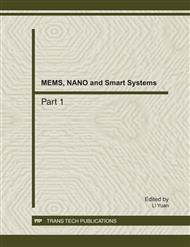[1]
W. L. Luyben, Chemical reactor design and control, John Wiley & Sons, Inc.: New Jersey, 2007, pp.122-123.
Google Scholar
[2]
C. Qu. Cheryl and J. Hahn, Computation of arrival cost for moving horizon estimation via unscented Kalman filtering, J. Proc. Cont. vol. 19, p.358–363, (2009).
DOI: 10.1016/j.jprocont.2008.04.005
Google Scholar
[3]
V. Becerra, P. Roberts and G. Griffiths, Applying the extended Kalman Filter to systems described by nonlinear differential-algebraic equations, Cont. Eng. Prac. vol. 9, p.267–281, (2001).
DOI: 10.1016/s0967-0661(00)00110-6
Google Scholar
[4]
S. A. Middlebrooks, Modelling and control of silicon and germanium thin film chemical vapor deposition, Ph.D. dissertation, University of Wisconsin-Madison, (2001).
Google Scholar
[5]
V. Prasad, M. Schley, L. P. Russo and B.W. Bequette, Product property and production rate control of styrene polymerization, J. Proc. Cont. vol. 1, p.353–372, (2002).
DOI: 10.1016/s0959-1524(01)00044-0
Google Scholar
[6]
R. Gudi, S. Shah and M. Gray , Multi rate state and parameter estimation in an antibiotic fermentation with delayed measurements, Boitech. Bioeng. Vol. 44, p.1271–1278, (1994).
DOI: 10.1002/bit.260441102
Google Scholar
[7]
J. Rawlings and B. Bakshi, Particle filtering and moving horizon state estimation, Comp. Chem. Eng . vol. 30, p.1529–1541, (2006).
DOI: 10.1016/j.compchemeng.2006.05.031
Google Scholar
[8]
F. Daum , Nonlinear filters: Beyond the kalman filter, IEEE. Aerosp. Electron. Syst. Mag. vol. 20, p.57–69, (2005).
DOI: 10.1109/maes.2005.1499276
Google Scholar
[9]
M. Chaves, and E. Sontag, State-estimators for chemical reaction networks of Feinberg-Horn-Jackson zero deficiency type, Euro. J. Cont. vol. 8, p.343–359, (2002).
DOI: 10.3166/ejc.8.343-359
Google Scholar
[10]
M. J. Tenny and J. Rawlings, Efficient moving horizon estimation and nonlinear model predictive control, in Proc. Am. Contr. Conf., Anchorage, USA, 2002, May 8-10.
DOI: 10.1109/acc.2002.1025355
Google Scholar
[11]
E. L. Haseltine and J. B. Rawlings, Critical evaluation of extended Kalman filtering and moving horizon estimation, Ind. Eng. Chem. Res. vol. 44, p.2451–2460, (2005).
DOI: 10.1021/ie034308l
Google Scholar
[12]
P. Kuhl, M. Diehl, T. Kraus, J. P. Schloder and H. G. Bock, A real-time algorithm for moving horizon state and parameter estimation, Comp. Chem. Eng . vol. 34, pp.1016-1045, (2010).
Google Scholar
[13]
J. Prakash and R. Senthil, Design of observer based nonlinear model predictive controller for a continuous stirred tank reactor, J. Proc. Cont. vol. 18, p.504–514, (2008).
DOI: 10.1016/j.jprocont.2007.08.001
Google Scholar
[14]
X. W. Zhang, S. H. Chan, H. Ko. Ho, J. Li, G. Li and Z. Feng, Nonlinear model predictive control based on the moving horizon state estimation for the solid oxide fuel cell, Int. J. Hyd. Ene. vol. 33, p.2355 – 2366, (2008).
DOI: 10.1016/j.ijhydene.2008.02.063
Google Scholar


